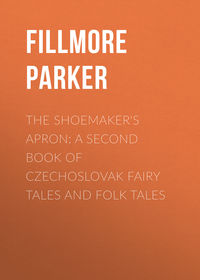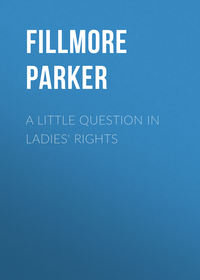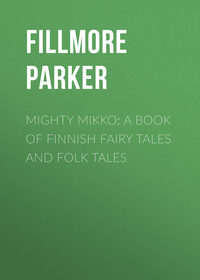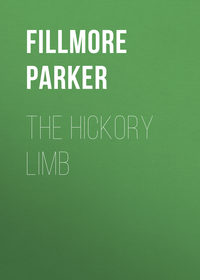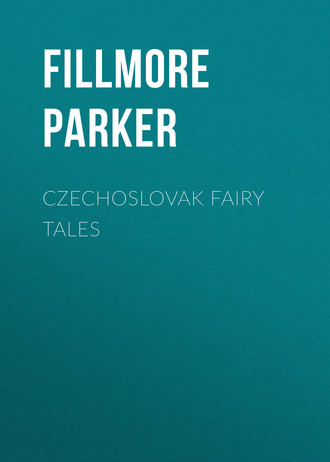 полная версия
полная версияCzechoslovak Fairy Tales
So she got ready for Dorla a fine new bed and stylish clothes and as much good food as she could carry. The next day the man took Dorla out into the mountains and built her a little hut of two rooms.
Dorla sat in the hut and thought about the good supper she was going to cook for herself.
In the evening the same old beggar came and said to her:
“May God grant you happiness, my child. Won’t you please wash my face?”
“Wash your face, indeed!” cried Dorla in a rage. “This is what I’ll do to you!” And she took a stick and drove the old beggar away.
“Very well!” he muttered. “Very well! Very well!”
Then Dorla cooked herself a fine supper. After she had eaten every bite of it herself, she lay down on the bed and went soundly to sleep.
At midnight Long Beard knocked at the door and called out:
“A man am ISix inches high,But a long, long beardHangs from my chin.Open the doorAnd let me in!”Then Dorla was very frightened and she hid in the corner. Long Beard broke open the door and he caught Dorla and he shook her out of her skin. It served her right, too, for she was a wicked, spiteful girl and she had never been kind to anybody in her life.
Long Beard left her bones in a heap on the floor, and he hung her skin on the nail at the back of the door. Then he put her grinning skull in the window.
On the third day Dorla’s mother gave her husband a brand new table-cloth and said:
“Go now and see how my Dorla is getting on. Here is a table-cloth for the ducats.”
So the man took the table-cloth and went to the mountains. As he came near the hut, he saw something in the window that looked like grinning teeth. He said to himself:
“Dorla must be very happy to be smiling at me from this distance.”
But when he reached the hut all he found of Dorla was a heap of bones on the floor, the skin hanging on the nail behind the door, and the skull grinning in the window.
Without a word he gathered the bones into the table-cloth and started back.
As he neared home the old dog said:
“Bow-wow, mistress, here comes the master and it’s rattle-rattle before him and rattle-rattle behind him.”
“Not so, old dog!” cried the woman. “It’s chink-chink before him, and chink-chink behind him!”
But the old dog kept on barking and saying:
“No, no, bow-wow, it’s rattle-rattle before him and rattle-rattle behind him!”
In a rage the woman took a stick and beat the dog.
Then the man stepped into the cottage and at once his wife brought out a basket for the ducats. But when he shook out the table-cloth there was only the rattle-rattle of bones.
THE BIRD WITH THE GOLDEN GIZZARD
THE STORY OF TWO BROTHERSTHE BIRD WITH THE GOLDEN GIZZARDTHERE was once a poor man who had a large family. He was so poor that he had nothing to feed the children. For three days they had had no food. On the third day as the father was out cutting osiers he saw, sitting in a bush, a small bird that shone like gold.
“If I could snare that bird,” he thought to himself, “and take it home, the children would be amused and perhaps forget they were hungry.”
So he caught the bird and carried it home and, sure enough, the children were so delighted that for two days they didn’t cry for food.
On the third day the bird laid a golden egg. The oldest boy took the egg to the goldsmith to sell it. The goldsmith examined it and said:
“I don’t believe I have money enough to buy this egg.”
“Just give me some bread,” the boy said. “That will be enough.”
The goldsmith gave him two loaves of bread, one under each arm, and filled his pockets with golden ducats. So for once the whole family had all it could eat and still there was money left over.
Two days later the bird laid another golden egg which the boy carried to the goldsmith and sold for the same price.
Now the goldsmith had a son who said he would like to see this wonderful bird. So he went home with the boy. He looked the bird over very carefully and under its wings he discovered an inscription that no one else had seen. The inscription read:
Whoever eats my heart will become king.
Whoever eats my gizzard will find under his head each morning a heap of golden ducats.
The youth went home and told his father about the strange inscription. They talked the matter over and at last decided that it would be well for the young man to marry the poor man’s oldest daughter provided he could get the golden bird as dowry.
The goldsmith went to see the girl’s father and after some discussion the marriage was arranged.
The wedding day arrived. The bridegroom ordered the bird to be roasted and ready to be put on the table when the bridal party came home from church. It was his intention to eat the heart himself and have his bride eat the gizzard.
The children of the family cried bitterly at the thought of losing their pretty bird, but the bridegroom, of course, had his way.
Now two of the boys stayed home from the wedding and they decided that they would like very much to taste the roast bird if only they could find a piece that nobody would miss. They did not dare take a leg or a wing, but they thought it would be safe to pick out a morsel from the inside. So one boy ate the heart, the other the gizzard. Then they were so frightened at what they had done that they ran away and never came back.
When the bride and groom returned from church, the bird was carried to the table. The groom looked at once for the heart and the gizzard and was greatly shocked at their disappearance.
The two boys who had gone out into the world found work with a merchant. They slept together and every morning the merchant’s wife found a heap of golden ducats under the feather bed. She didn’t know to which boy they belonged. She took them and saved them for a whole year until they filled a hogshead.
At the end of a year the boys decided to go out again into the world. The merchant showed them all the ducats his wife had found in their bed and he said to them:
“Take with you as many as you want now and when you come back you may have the rest.”
The brothers parted company and each set out alone, the one to the left, the other to the right.
The younger brother came to a tavern. The landlady had two daughters who were so sharp at cards that they very soon won all the money he had. When he was picked clean he asked them to stop playing until the next morning when he would again have plenty of money.
Sure enough in the morning when he got up he had all the money he wanted. The girls asked him where it came from and he told them.
When they heard about the gizzard he had swallowed, they put something in his wine that made him sick at his stomach and he threw up the gizzard. The younger girl instantly snatched it, washed it, and swallowed it herself. Then as he had no more money they drove the poor boy away.
As he wandered in the fields he grew very hungry. He came to a meadow where he found a kind of sorrel that he ate. As soon as he ate it he turned into a goat and went jumping about the bushes nibbling at the leaves. He chanced to eat a kind of leaf that changed him back into himself.
“Ah,” he thought, “now I know what to do!”
He picked some of the sorrel and some of the other leaves and went straight back to the tavern. He told them there that he was bringing them a present of a new kind of spinach that tasted very good. They asked him would he cook it for them.
The cook tasted it and at once she turned into a goat. The serving maid came into the kitchen and when she saw a goat there she drove it out. The youth asked the maid would she like to taste the new spinach. She tasted it and immediately she turned into a goat. Then when the landlady and her two daughters tasted it they, too, turned into goats.
He fed the cook and the serving maid some of the other leaves and they turned back into themselves. But the other three he left as goats.
He made halters for them and then he hitched them up and drove off.
He drove on and on until he came to a town where the king was building himself a castle. Now this king was his brother who had eaten the magic bird’s heart. The king’s workmen were hauling stone for the new castle, so he decided to put his goats to work hauling stone. He loaded his cart heavier than all the other carts.
The king noticed him and recognized him and asked him where he got those goats. So he told the king the whole story. The king thought the goats had been punished long enough and begged his brother to have pity on them and restore them. He took the king’s advice and did so.
When they were once more human beings, he married the girl who had swallowed the gizzard. They soon became very rich, for every morning there was a heap of golden ducats under her head.
THE WOOD MAIDEN
THE STORY OF BETUSHKA AND THE GOLDEN BIRCH LEAVESTHE WOOD MAIDENBETUSHKA was a little girl. Her mother was a poor widow with nothing but a tumble-down cottage and two little nanny-goats. But poor as they were Betushka was always cheerful. From spring till autumn she pastured the goats in the birch wood. Every morning when she left home her mother gave her a little basket with a slice of bread and a spindle.
“See that you bring home a full spindle,” her mother always said.
Betushka had no distaff, so she wound the flax around her head. Then she took the little basket and went romping and singing behind the goats to the birch wood. When they got there she sat down under a tree and pulled the fibers of the flax from her head with her left hand, and with her right hand let down the spindle so that it went humming along the ground. All the while she sang until the woods echoed and the little goats nibbled away at the leaves and grass.
When the sun showed midday, she put the spindle aside, called the goats and gave them a mouthful of bread so that they wouldn’t stray, and ran off into the woods to hunt berries or any other wild fruit that was in season. Then when she had finished her bread and fruit, she jumped up, folded her arms, and danced and sang.
The sun smiled at her through the green of the trees and the little goats, resting on the grass, thought: “What a merry little shepherdess we have!”
After her dance she went back to her spinning and worked industriously. In the evening when she got home her mother never had to scold her because the spindle was empty.
One day at noon just after she had eaten and, as usual, was going to dance, there suddenly stood before her a most beautiful maiden. She was dressed in white gauze that was fine as a spider’s web. Long golden hair fell down to her waist and on her head she wore a wreath of woodland flowers.
Betushka was speechless with surprise and alarm.
The maiden smiled at her and said in a sweet voice:
“Betushka, do you like to dance?”
Her manner was so gracious that Betushka no longer felt afraid, and answered:
“Oh, I could dance all day long!”
“Come, then, let us dance together,” said the maiden. “I’ll teach you.”
With that she tucked up her skirt, put her arm about Betushka’s waist, and they began to dance. At once such enchanting music sounded over their heads that Betushka’s heart went one-two with the dancing. The musicians sat on the branches of the birch trees. They were clad in little frock coats, black and gray and many-colored. It was a carefully chosen orchestra that had gathered at the bidding of the beautiful maiden: larks, nightingales, finches, linnets, thrushes, blackbirds, and showy mocking-birds.
Betushka’s cheeks burned, her eyes shone. She forgot her spinning, she forgot her goats. All she could do was gaze at her partner who was moving with such grace and lightness that the grass didn’t seem to bend under her slender feet.
They danced from noon till sundown and yet Betushka wasn’t the least bit tired. Then they stopped dancing, the music ceased, and the maiden disappeared as suddenly as she had come.
Betushka looked around. The sun was sinking behind the wood. She put her hands to the unspun flax on her head and remembered the spindle that was lying unfilled on the grass. She took down the flax and laid it with the spindle in the little basket. Then she called the goats and started home.
She reproached herself bitterly that she had allowed the beautiful maiden to beguile her and she told herself that another time she would not listen to her. She was so quiet that the little goats, missing her merry song, looked around to see whether it was really their own little shepherdess who was following them. Her mother, too, wondered why she didn’t sing and questioned her.
“Are you sick, Betushka?”
“No, dear mother, I’m not sick, but I’ve been singing too much and my throat is dry.”
She knew that her mother did not reel the yarn at once, so she hid the spindle and the unspun flax, hoping to make up tomorrow what she had not done today. She did not tell her mother one word about the beautiful maiden.
The next day she felt cheerful again and as she drove the goats to pasture she sang merrily. At the birch wood she sat down to her spinning, singing all the while, for with a song on the lips work falls from the hands more easily.
Noonday came. Betushka gave a bit of bread to each of the goats and ran off to the woods for her berries. Then she ate her luncheon.
“Ah, my little goats,” she sighed, as she brushed up the crumbs for the birds, “I mustn’t dance today.”
“Why mustn’t you dance today?” a sweet voice asked, and there stood the beautiful maiden as though she had fallen from the clouds.
Betushka was worse frightened than before and she closed her eyes tight. When the maiden repeated her question, Betushka answered timidly:
“Forgive me, beautiful lady, for not dancing with you. If I dance with you I cannot spin my stint and then my mother will scold me. Today before the sun sets I must make up for what I lost yesterday.”
“Come, child, and dance,” the maiden said. “Before the sun sets we’ll find some way of getting that spinning done!”
She tucked up her skirt, put her arm about Betushka, the musicians in the treetops struck up, and off they whirled. The maiden danced more beautifully than ever. Betushka couldn’t take her eyes from her. She forgot her goats, she forgot her spinning. All she wanted to do was to dance on forever.
At sundown the maiden paused and the music stopped. Then Betushka, clasping her hands to her head, where the unspun flax was twined, burst into tears. The beautiful maiden took the flax from her head, wound it round the stem of a slender birch, grasped the spindle, and began to spin. The spindle hummed along the ground and filled in no time. Before the sun sank behind the woods all the flax was spun, even that which was left over from the day before. The maiden handed Betushka the full spindle and said:
“Remember my words:
“Reel and grumble not!Reel and grumble not!”When she said this, she vanished as if the earth had swallowed her.
Betushka was very happy now and she thought to herself on her way home: “Since she is so good and kind, I’ll dance with her again if she asks me. Oh, how I hope she does!”
She sang her merry little song as usual and the goats trotted cheerfully along.
She found her mother vexed with her, for she had wanted to reel yesterday’s yarn and had discovered that the spindle was not full.
“What were you doing yesterday,” she scolded, “that you didn’t spin your stint?”
Betushka hung her head. “Forgive me, mother. I danced too long.” Then she showed her mother today’s spindle and said: “See, today I more than made up for yesterday.”
Her mother said no more but went to milk the goats and Betushka put away the spindle. She wanted to tell her mother her adventure, but she thought to herself: “No, I’ll wait. If the beautiful lady comes again, I’ll ask her who she is and then I’ll tell mother.” So she said nothing.
On the third morning she drove the goats as usual to the birch wood. The goats went to pasture and Betushka, sitting down under a tree, began to spin and sing. When the sun pointed to noon, she laid her spindle on the grass, gave the goats a mouthful of bread, gathered some strawberries, ate her luncheon, and then, giving the crumbs to the birds, she said cheerily:
“Today, my little goats, I will dance for you!”
She jumped up, folded her arms, and was about to see whether she could move as gracefully as the beautiful maiden, when the maiden herself stood before her.
“Let us dance together,” she said. She smiled at Betushka, put her arm about her, and as the music above their heads began to play, they whirled round and round with flying feet. Again Betushka forgot the spindle and the goats. Again she saw nothing but the beautiful maiden whose body was lithe as a willow shoot. Again she heard nothing but the enchanting music to which her feet danced of themselves.
They danced from noon till sundown. Then the maiden paused and the music ceased. Betushka looked around. The sun was already set behind the woods. She clasped her hands to her head and looking down at the unfilled spindle she burst into tears.
“Oh, what will my mother say?” she cried.
“Give me your little basket,” the maiden said, “and I will put something in it that will more than make up for today’s stint.”
Betushka handed her the basket and the maiden took it and vanished. In a moment she was back. She returned the basket and said:
“Look not inside until you’re home!Look not inside until you’re home!”As she said these words she was gone as if a wind had blown her away.
Betushka wanted awfully to peep inside but she was afraid to. The basket was so light that she wondered whether there was anything at all in it. Was the lovely lady only fooling her? Halfway home she peeped in to see.
Imagine her feelings when she found the basket was full of birch leaves! Then indeed did Betushka burst into tears and reproach herself for being so simple. In her vexation she threw out a handful of leaves and was going to empty the basket when she thought to herself:
“No, I’ll keep what’s left as litter for the goats.”
She was almost afraid to go home. She was so quiet that again the little goats wondered what ailed their shepherdess.
Her mother was waiting for her in great excitement.
“For heaven’s sake, Betushka, what kind of a spool did you bring home yesterday?”
“Why?” Betushka faltered.
“When you went away this morning I started to reel that yarn. I reeled and reeled and the spool remained full. One skein, two skeins, three skeins, and still the spool was full. ‘What evil spirit has spun that?’ I cried out impatiently, and instantly the yarn disappeared from the spindle as if blown away. Tell me, what does it mean?”
So Betushka confessed and told her mother all she knew about the beautiful maiden.
“Oh,” cried her mother in amazement, “that was a wood maiden! At noon and midnight the wood maidens dance. It is well you are not a little boy or she might have danced you to death! But they are often kind to little girls and sometimes make them rich presents. Why didn’t you tell me? If I hadn’t grumbled, I could have had yarn enough to fill the house!”
Betushka thought of the little basket and wondered if there might be something under the leaves. She took out the spindle and unspun flax and looked in once more.
“Mother!” she cried. “Come here and see!”
Her mother looked and clapped her hands. The birch leaves were all turned to gold!
Betushka reproached herself bitterly: “She told me not to look inside until I got home, but I didn’t obey.”
“It’s lucky you didn’t empty the whole basket,” her mother said.
The next morning she herself went to look for the handful of leaves that Betushka had thrown away. She found them still lying in the road but they were only birch leaves.
But the riches which Betushka brought home were enough. Her mother bought a farm with fields and cattle. Betushka had pretty clothes and no longer had to pasture goats.
But no matter what she did, no matter how cheerful and happy she was, still nothing ever again gave her quite so much pleasure as the dance with the wood maiden. She often went to the birch wood in the hope of seeing the maiden again. But she never did.
THE GOLDEN SPINNING WHEEL
THE STORY OF KING DOBROMIL AND THE GOOD DOBRUNKATHE GOLDEN SPINNING WHEELTHERE was once a poor woman who had twin daughters. The girls were exactly alike in face and feature but utterly different in disposition. Dobrunka was kind, industrious, obedient, and everything a good girl ought to be. Zloboha, her sister, was spiteful, disobedient, lazy, and proud. In fact, she had just about as many faults as a person could have. Yet strange to say the mother loved Zloboha much better and made everything easy for her.
They lived in a cottage a few miles from town. The cottage stood by itself in a little clearing in the woods. Hardly any one ever passed it except occasionally some man who had lost his way in the woods.The mother put her favorite, Zloboha, out to service so that she might learn city ways, but she kept Dobrunka at home to do the housework and take care of the garden. Dobrunka always began the day by feeding the goats, then she prepared the breakfast, swept the kitchen, and when everything else was done she sat down at her spinning wheel and spun.She seldom benefited from the yarn she spun so carefully, for her mother always sold it in town and spent the money on clothes for Zloboha. Yet Dobrunka loved her mother although she never had a kind word or a kind look from her the whole day long. She always obeyed her mother instantly and without a frown and no one ever heard her complain about all the work she had to do.
They lived in a cottage a few miles from town. The cottage stood by itself in a little clearing in the woods. Hardly any one ever passed it except occasionally some man who had lost his way in the woods.
The mother put her favorite, Zloboha, out to service so that she might learn city ways, but she kept Dobrunka at home to do the housework and take care of the garden. Dobrunka always began the day by feeding the goats, then she prepared the breakfast, swept the kitchen, and when everything else was done she sat down at her spinning wheel and spun.
She seldom benefited from the yarn she spun so carefully, for her mother always sold it in town and spent the money on clothes for Zloboha. Yet Dobrunka loved her mother although she never had a kind word or a kind look from her the whole day long. She always obeyed her mother instantly and without a frown and no one ever heard her complain about all the work she had to do.
One day when her mother was going to town Dobrunka went part of the way with her, carrying her yarn wrapped up in a kerchief.
“Now see that you’re not lazy while I’m away,” her mother said, crossly.
“You know, mother, you never have to nag at me. Today when I finish the housework, I’ll spin so industriously that you’ll be more than satisfied when you get home.”
She handed her yarn to her mother and went back to the cottage. Then when she had put the kitchen in order, she sat down to her wheel and began to spin. Dobrunka had a pretty voice, as pretty as any of the song-birds in the forest, and always when she was alone she sang. So today as she sat spinning she sang all the songs she knew, one after the other.
Suddenly she heard outside the trample of a horse. “Some one is coming,” she thought to herself, “someone who has lost his way in the woods. I’ll go see.”
She got up from her wheel and peeped out through the small window. A young man was just dismounting from a spirited horse.
“Oh,” thought Dobrunka to herself, “what a handsome young lord he is! How well his leather coat fits him! How well his cap with its white feather looks on his black hair! Ah, he is tying his horse and is coming in. I must slip back to my spinning.”
The next moment the young man opened the door and stepped into the kitchen. All this happened a long time ago, you see, when there were no locks or bars on the doors, and there didn’t have to be because nothing was ever stolen.
“Good day to you, my girl,” the young man said to Dobrunka.
“Good day, sir,” Dobrunka answered. “What is it, sir, you want?”
“Will you please get me a little water. I’m very thirsty.”
“Certainly,” Dobrunka said. “Won’t you sit down while I’m getting it?”


